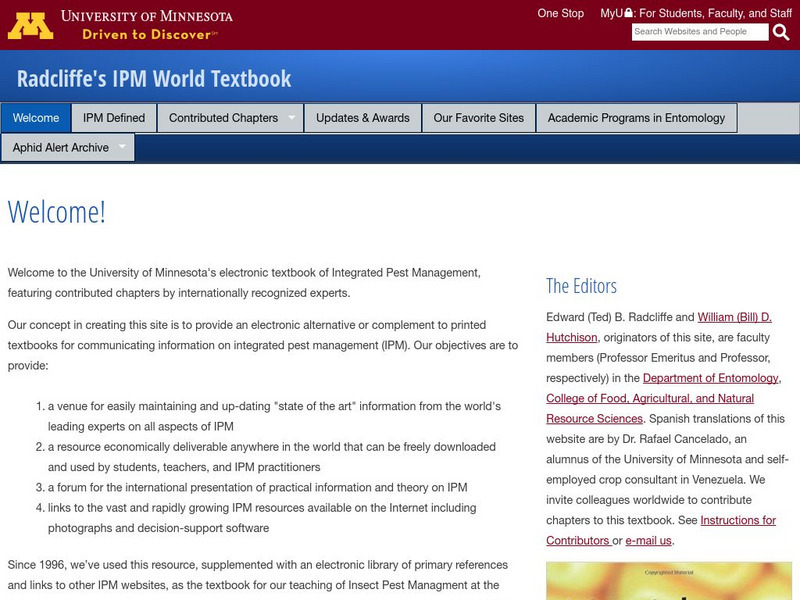Hi, what do you want to do?
Cornell University
Weed IPM
Go on a weed hunt! Scholars gain insight into the characteristics of plants and examine the outdoor environment in order to identify five different types of weeds. Learners then show what they know with a one-page reflection.
Cornell University
What is IPM?
Discover what a pest is and how to identify one with a lesson that looks closely at our outside world and taxonomy. Scholars investigate insects and plants to practice their identification skills, take a survey, and explore the...
National Park Service
Who Grows There?
More than 127 non-native species live in Glacier National Park in Montana and their infestations are growing! Pupils read about and gather samples of exotic plants. Participants create a master book of pressed plants and complete a...
Curated OER
Out of Control
Students release care of a lawn. In this Science lesson, students observe the changes that occur when lawn maintenance is stopped. Students record data from several observations.
Curated OER
Graphing the Population Explosion of Weeds
Students are introduced to the seed cycle and draw the specific steps. In groups, they identify the human barriers to the spreading of weeds. After calculating the rate of spreading of the Yellowstar Thistle, they create graphs to see a...
Curated OER
Scavenger Hunt
Students explore area around schoolyard by participating in scavenger hunt, examine things that live there, such as noxious weeds, develop observation skills by using five senses, and find and identify ten to fifteen local, natural objects.
Curated OER
Mapping Your Schoolyard Habitat
Students explore the terrain, structures, plants and signs of habitats around their schoolyard. They draw a sketch map showing the different areas around the schoolyard. Students identify the location of weeds and native plants on their...
Curated OER
Desinging and Using a Dichotomous Key
High schoolers are examine the purpose of dichotomous keys. In groups, they design their own in order to describe the characteristics of plants and weeds native to California. To end the lesson, they define new terminology associated...
Curated OER
Campus/community Weed Pull
Students practice field identification of exotic invasive species. They use their identification key, and invasive plant species flash cards to identify and dig up exotic invasive species in a preselected
area as a community service.
Curated OER
Weeds-Wild and Wonderful
Young scholars compare and contrast weeds and desirable plants. They explore the ways which their ancestors used weeds and depended on them for food and other household necessities.
Curated OER
Weedy Socks & Wheels
Young scholars engage in a lesson that is concerned with the concept of using socks in order to collect weed seeds. They conduct research in order to illustrate the ease of how weeds are spread from one area to another. Students conduct...
Curated OER
Pulling Together With Natives -- The Bradley Sisters' Story
Students identify the four ways to stop the spread of weeds in California. In groups, they practice the five methods of removing and controling the spread of the weeds. To end the lesson, they summarize the Bradley sisters way of...
Curated OER
Walk To School
Students recognize invasive plant species. They use their field notebooks with plant descriptions to identify and tally exotic invasive species either on their way to school or in their own neighborhood.
Curated OER
Where Do Weeds Grow Best?
Student design an experiment in order to determine where weeds grow the best. Through data collection and observations, they discover optimum conditions for weed growth, conditions that make it difficult for weeds to grow, and create...
Curated OER
Poet-Tree (or shrub or forb)
Students write poetry to describe a noxious weed. They form a personal relationship with, and a better comprehension of weeds. Students explain what the basic elements of a haiku are. They describe a particular weed, and comprehend...
Curated OER
Wacky Weed Parts
Students view picture of weed and identify roots, stems, flowers, leaves, and seeds, describe function of each different weed part, and discuss how different parts of weed work together to benefit plant in its new environment.
Curated OER
Tagging Race
Students examine and identify plant parts to recognize specific weeds, identify three different weeds, discern differences in weeds quickly, evaluate classmates' weed recognition, and discuss what strategies they used to identify weeds.
Curated OER
Weeds on the Windowsill
Students study farming and reasons to control weeds. They examine pesticides necessary for the control of weeds and the damage to the environment. Through experimentation, students plant seeds in different soils and determine if seeds...
Other
National Integrated Pest Management Network
This site shows general info on IPM, but allows you to get specific by picking a pest or a commodity.
University of Minnesota
University of Minnisota: Radcliffe's Ipm World Textbook
This is a site designed and used by professors to teach integrated pest management. A part of the National IPM network. Gives great photos and countless suggestions.
University of Georgia
University of Georgia: Integrated Pest Management Basics
Gives general info on Integrated Pest Management. Along with news, IPM contacts, publications, and related links. Also lists various subject areas to look into.
Other
Georgia Invasive Species Task Force
Provides pertinent info on different resources concerning pest and pest management. Specifics on Entomology, weeds, diseases, 4-H/FFA info, forestry.
Alabama Learning Exchange
Alex: From Weeds to Worms
The purpose of this lesson is to guide students in researching and discovering the importance of the interdependence of living and nonliving things in an ecosystem. Students utilize technology independently and cooperatively to establish...

























